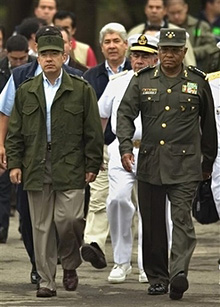 |
 |
 |
 Editorials | Issues | January 2007 Editorials | Issues | January 2007  
Calderón Prepares Troops for Long Offensive
 Kelly Arthur Garrett - Herald Mexico Kelly Arthur Garrett - Herald Mexico


| | Wearing a military cap and jacket, Mexico's President Felipe Calderon, left, walks with Mexico's Secretary of Defense, Guillermo Galvan as they arrive at a military base in Apatzingan, Mexico, Wednesday, Jan. 3, 2007. President Calderon sent 7,000 troops to his home state of Michoacan immediately after taking office on Dec. 1 and now has announced that he will be sending some 3,300 soldiers and federal police officers to fight drug gangs in the crime-plagued border city of Tijuana. (AP/Guillermo Arias) |
Sounding increasingly like a war president in his second month in office, President Calderón rallied federal troops Wednesday, urging them "not to lose heart" in what he said could be a drawn-out offensive against organized drug traffickers.

As the president spoke in the Michoacán town of Apatzingán Wednesday morning, more than 3,200 Army, Navy and federal police personnel prepared to open a second front in the offensive that appears to be defining Calderón´s early presidency.

"Operation Tijuana" will deploy mainly Army troops - using 21 planes, nine helicopters and 247 military vehicles - to crack down on the Tijuana cartel that has turned the border city into one of Mexico´s most dangerous.

Soldiers went into at least two Tijuana police stations and checked the documents and weapons of hundreds of officers.

Federal investigators allege there is a corrupt network of police in the city supporting traffickers who smuggle tons of cocaine, methamphetamine and marijuana over the busy border crossing into the United States. There were no immediate reports of arrests by the soldiers, the Associated Press reported.

Calderón indicated that the states of Michoacán and Baja California may be only the first of many theaters in his new drug war.

"We have been carrying out this joint operation in Michoacán and as of yesterday a similar one in the city of Tijuana," the president said Wednesday. "But we also need to attend to the needs of many other of the nation´s cities and regions that are threatened by crime and violence."

Wearing an olive-green cap with a five-starred insignia indicating his rank as the supreme commander of the military, Calderón used the language of national defense as he praised his troops for their effort so far in the so-called Michoacán Joint Operation that began Dec. 11.

"Organized crime in Mexico, especially in this state with the largest number of violent crime victims, has profoundly damaged our families´ quality of life and our ability to grow and be successful in the world," he said. "But if we continue in our work, our cities and our land will no longer be in the hands of the criminals."

And as wartime presidents often need to do, Calderón urged the gathered troops to be prepared for a long haul.

"The task will not be easy or quick," he said. "It will require an enormous commitment from the public, including, regrettably, the loss of human life. I ask you not to lose heart, and to continue with determination in this struggle against organized crime."

At the breakfast event, Calderón was flanked by most of the Security Cabinet chiefs who had announced the Tijuana operation the day before, including the secretaries of the Army and Navy. Each echoed the president´s martial tone.

"The battle has begun against those who are threatening our security," said Defense Secretary Guillermo Galván Galván. "Our commitment is to recover a sense of security for our nation."

Galván reported that in three weeks, the Michoacán offensive had destroyed 5,023 marijuana fields in the state and resulted in the arrest of 80 suspected drug traffickers. Firearms (127), shells of various calibers (32,800), grenades (41) and vehicles (35) were confiscated, as well as four kilograms of poppy seeds and about US$4,000 in cash.

But EL UNIVERSAL reported Wednesday that knowledgeable officials in the federal Attorney General´s Office (PGR) doubted that even as many as 2,000 marijuana fields existed in Michoacán in December, let alone were found and destroyed.

Other public figures have criticized the Michoacán offensive as a showboating operation yielding few results and doing little to stop violence.

Commenting on the new front in Tijuana, Institutional Revolutionary Party (PRI) national spokesperson Carlos Flores Rico said wryly, "We hope there are better results than what we´ve seen so far in Michoacán."

Still, both major opposition parties - the PRI and the Democratic Revolution Party (PRD) - issued statements Wednesday that were mostly supportive of the new campaign in Tijuana.

PRD Secretary General Guadalupe Acosta Naranjo said the operation is a "positive step," noting that the military, unlike the federal police forces, is free of criminal infiltrators. And the PRI´s Flores Rico nevertheless said, "The fact that federal forces are going in will help weaken organized crime´s actions."

Some concern about Operation Tijuana was expressed by the governor of the state of Sonora, who questioned the wisdom of limiting the campaign to one state in the north. "It could scare them into Sonora," said Gov. Eduardo Bours Castelo (PRI).

Both theaters in Calderón´s early-term military moves are governed by opposition parties, and both will hold gubernatorial elections this year.

Michoacán´s PRD governor, Lázaro Cárdenas Batel, hosted the president at Wednesday´s breakfast and expressed vigorous support of the Michoacán Joint Operation. "I want to congratulate everybody who has participated in this operation ... putting your life at risk every day for the people of Michoacán and the nation," he said.

EL UNIVERSAL staff writers Silvia Otero in Mexico City and Alberto Morales in Hermosillo, Sonora, contributed to this report. | 
 | |
 |



